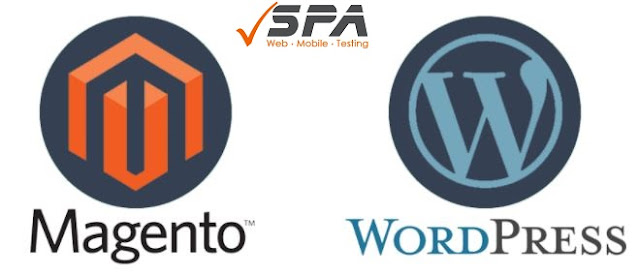Which one is better between Magento and Wordpress?
If you're currently running a website and need to incorporate e-commerce options to grow your business, you may feel somewhat overwhelmed by the range of options on the market.
In this article, we are going to highlight a number of the professionals and cons of the 2 most popular solutions - Magento and WordPress - to assist you create the right call for your business.
If you've got any expertise in WordPress web development, the quality of Magento may seem daunting compared, therefore during this article we are going to conjointly offer you some tips on the way to use Magento dead, as you'd with WordPress.
WordPress Vs. Magento – The Similarities
On the surface, the two platforms are architecturally similar. they're each customizable, search engine friendly, can be generally thematic and have a powerful on-line support community. each square measure basically content management systems, allowing you to add, edit and manage your content in the simplest and best way attainable. However, their differences dwell their main objective, WordPress being a lot of content-oriented and Magento being solely dedicated to e-commerce.
WordPress :
WordPress is AN open supply blogging platform and content management system. over 60 million websites, or 17 november of the overall sites, are operated on WordPress. Even sites like eBay, that owns Magento, use WordPress for his or her blogs. additionally to being very easy, it's also known for providing an easy-to-integrate plug-in design and template customization. the essential e-commerce practicality in WordPress are often achieved through varied third-party plugins, like the popular WooCommerce plugin, the easy digital transfer plugin, and others, as shown during this chart.
In this article, we are going to highlight a number of the professionals and cons of the 2 most popular solutions - Magento and WordPress - to assist you create the right call for your business.
If you've got any expertise in WordPress web development, the quality of Magento may seem daunting compared, therefore during this article we are going to conjointly offer you some tips on the way to use Magento dead, as you'd with WordPress.
WordPress Vs. Magento – The Similarities
On the surface, the two platforms are architecturally similar. they're each customizable, search engine friendly, can be generally thematic and have a powerful on-line support community. each square measure basically content management systems, allowing you to add, edit and manage your content in the simplest and best way attainable. However, their differences dwell their main objective, WordPress being a lot of content-oriented and Magento being solely dedicated to e-commerce.
WordPress :
WordPress is AN open supply blogging platform and content management system. over 60 million websites, or 17 november of the overall sites, are operated on WordPress. Even sites like eBay, that owns Magento, use WordPress for his or her blogs. additionally to being very easy, it's also known for providing an easy-to-integrate plug-in design and template customization. the essential e-commerce practicality in WordPress are often achieved through varied third-party plugins, like the popular WooCommerce plugin, the easy digital transfer plugin, and others, as shown during this chart.
Magento
Magento, like WordPress, is based on open source technology. It is an e-commerce platform with many dedicated e-commerce functions that have been endorsed by more than 150,000 online store owners, including some of the world's leading brands, ranging from small businesses to large multinational corporations.
Magento offers a high level of customization and functionality that allows merchants to configure their online stores according to their needs and offer comprehensive features such as multi-store management, reporting, mobile commerce, marketing, search engine optimization and other vital management tools. The Magento interface also makes it easy to create complex content pages, menus and version controls very similar to WordPress. In addition, Magento is more secure than third-party extensions of WordPress.
If you have come to the conclusion that the use of Magento is adapted to your activity, the first thing to do is to go to Magento.com and choose your Magento edition:
- Enterprise Edition is a cost-effective, bespoke solution that delivers superior performance and scalability for large, fast-growing enterprises. It also gives you access to expert support and hundreds of extensions and features that you can use to power your store and generally give you more control over your website.
- The community edition is available as a free download and is more for developers who know Magento or small businesses who want to hire a developer for their own account. This edition of Magento is an open source solution and gives you access to community support, as well as all the basic features of Magento, such as adding product categories, user groups, coupons, and more. Plus, you can use great features that are unique to Magento, like multistore, related products, up-sells and cross-sells.Therefore, we've created it clear that Magento is that the simplest and recommended various to WordPress for selling product on-line, however it's conjointly rather more advanced and needs the experience of knowledgeable UN agency is quite dearly-won. As WordPress continues to evolve, we are able to expect higher solutions for giant businesses, and easier-to-use management tools that may change true in favor of WordPress. till that happens, WordPress can still give a reliable content selling channel whereas Magento remains the ultimate alternative for selling product on-line.
Identify Purpose of Your Website
Choosing one of the two depends primarily on the purpose of your website. If you've come up reading this article, then you're probably looking to start an ecommerce business, but what kind of activity do you want to meet at your online store? Some options may include:
- Establish a multi-vendor market - this is the kind of complex solutions where you are better with Magento. Although some solutions also exist on WordPress, they are far from perfect, and can not compete with the robustness that Magento has to offer.
- Selling Virtual Products - Since virtual products do not require complex shipping arrangements, tracking and tracking orders, they can easily be done with WordPress using Easy Digital Downloads or by WooCommerce.
- Deliver Business Services - This can be done with both platforms, none of which is entirely simple when integrated with a shopping cart solution. While Magento has built accommodations for this type of activity in its product types, with WordPress you will need to use additional plugins such as WP events (to schedule meetings), wp contact (to build complex questionnaires for your customers) and other modules, depending on what you want to achieve exactly.
- Sale of physical products - Again, this is something that can be done on both platforms and in various ways. The ultimate question should be the number of products you want to sell. If your answer is over 500 products, you should probably go with Magento.
As you can see, there is no one-size-fits-all solution, and while the Magento feature is certainly more suited to e-Commerce, it also requires a lot more knowledge, skills and money than WordPress. It is also important to mention that the functionality of WordPress e-commerce plugins is limited. If you want to integrate different shipping options, multiple payment gateways, or running your store in multiple languages, WordPress may not be able to meet all of these needs. On the other hand, in the Magento admin panel, you'll find that much of it is dedicated to e-commerce capabilities, and not so much to content marketing.
Differences in Development
As soon as you start the development, the differences between WordPress and Magento will become very apparent. If you have already worked on WordPress, Magento may seem complicated to learn because of differences in terminology and applications. However, learning Magento could be easier if you understand the similarities between the two platforms, after all, they are both content management systems.
Templates
WordPress consists of several pages and editable messages. When developing template files, a set of functions and loops is used to call the content of the publication and the page. Custom template files can also be created and applied to a single page.
Magento works quite similarly in general, but sometimes something that can be done via WordPress in a few clicks would be done in a more programmatic way with Magento. For example, in Magento, you can not configure additional CMS template templates simply by creating a new template file. Instead, you must also create a new module that updates the list of available templates.
CMS Static Blocks
The static blocks of CMS in the Magento functions look like a combination of messages and widgets in WordPress. CMS static blocks are required to place text and images on a CMS page or in a template. They act much like widgets in WordPress, which manages structural elements and design in a template. Also note that Magento also offers its own widgets, which offers a higher level of functionality than static blocks.
The main difference between the two is that the programming contained in WordPress is based on a set of PHP scripts, while Magento is powered by the object-oriented concept, and involves a number of files and folders. In addition, WordPress has a unique naming convention, and most files are largely contained in the same folder, while in Magento, several files and folders share the same name.
These are just some tips for WordPress developers who have trouble getting their hands on Magento.
The Golden Path to Combine Magento and WordPress
A great way to attract traffic to your Magento store is to connect it to a WordPress blog, where you can tell potential customers about the products you are selling from the consumer's point of view rather than a marketing. This fast growing trend allows you to manage your blog directly from the Magento backend interface, while displaying a WordPress layout with its own URL on the front end. If you want to set up a WordPress blog for your store.
Conclusion:
Therefore, we've created it clear that Magento is that the simplest and recommended various to WordPress for selling product on-line, however it's conjointly rather more advanced and needs the experience of knowledgeable UN agency is quite dearly-won. As WordPress continues to evolve, we are able to expect higher solutions for giant businesses, and easier-to-use management tools that may change true in favor of WordPress. till that happens, WordPress can still give a reliable content selling channel whereas Magento remains the ultimate alternative for selling product on-line.
Therefore, we've created it clear that Magento is that the simplest and recommended various to WordPress for selling product on-line, however it's conjointly rather more advanced and needs the experience of knowledgeable UN agency is quite dearly-won. As WordPress continues to evolve, we are able to expect higher solutions for giant businesses, and easier-to-use management tools that may change true in favor of WordPress. till that happens, WordPress can still give a reliable content selling channel whereas Magento remains the ultimate alternative for selling product on-line.




Comments
Post a Comment